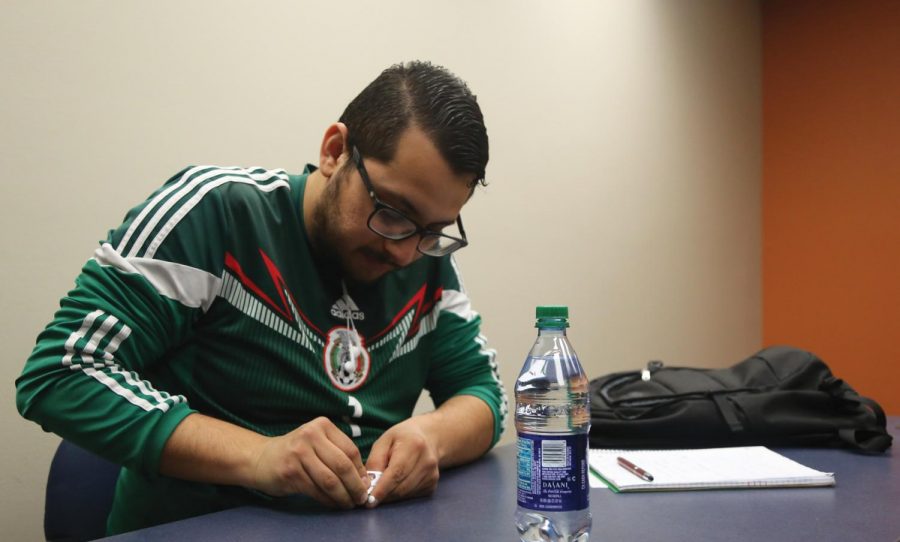My depression and anxiety have consumed me for years, but for the longest time I never took any type of action that would help me overcome the constant thoughts of sadness, loneliness, guilt and suicide.
For years, I struggled on my own. I never told anyone what was going on in my brain because I was too ashamed to be criticized or made fun of. I decided to pretend that I was happy because I noticed that people got scared and did everything they could to avoid “the talk” about mental health and the consequences it has in a person’s life.
My family and the majority of my friends in middle school and high school never knew that I had a lot of suicidal thoughts when I was inside of a classroom or while I was sitting on the couch at my house.
Keeping my depression and suicidal thoughts to myself was the safest thing to do—at least that’s what I would tell myself until my anxiety started to kick in.
One day while I was playing soccer, I started to feel a strong electrical sensation in my head, chest and shoulders that accelerated my heart rate to a speed that made me think I was going to die of a heart attack.
I then learned that the sensation was a panic attack.
Even when it got to the point where I was experiencing physical pain because of my depression and anxiety, I still decided not to seek any kind of support or help. So why didn’t I ever tell anyone about how I felt mentally and physically? Because people can be ignorant and uneducated when it comes to mental health and they just assume that it’s my fault for feeling depressed, as if I have control over it.
I had my first panic attack when I was 15, and still have them at 22. They can happen at any time of the day. I sometimes have them while I’m sitting in class, while I’m driving, when I’m showering and even when I’m doing interviews for The Prospector.
For some reason, it took almost eight years for me to build up the courage to see a doctor and get myself checked for my depression and anxiety.
I have not been the only one affected by my depression and anxiety. My girlfriend, who I met when I was 17, has also suffered from my pain. After watching me struggle with my mental health, she convinced me to go see a doctor.
As I was driving to the clinic that first visit, my hands were sweating and my head became filled with thoughts such as, “everything is going to go wrong,” “you’re never going to be happy” and “why are you even trying?”
My girlfriend noticed this and started to hold my hand to try as best as she could to make me feel comfortable and safe. I started to cry in the waiting room because I felt like something was about to go terribly wrong.
As soon as I heard the doctor call my name, my girlfriend stood up from her chair and said, “I’m going in with you.” My heart started to beat so fast that I wanted to run away and pretend I was never inside that clinic.
But I didn’t run. I knew it was time to take action.
[arve url=”https://www.youtube.com/watch?v=WniZ7f0uraI&t=32s” /]
The doctor started to ask questions about my mental and physical health and told me right away that my body was not producing enough serotonin, a chemical that has a wide variety of functions in the human body and that contributes to the well-being and happiness of a person.
Telling a stranger that I had suicidal thoughts was one of the hardest things I’ve ever done in my life, but at that point, I had reached rock bottom and I knew I couldn’t deny medical attention.
The first night I took my medication, I recorded a video of myself crying with the pill in my hand hoping that I could finally feel peace and happiness. My girlfriend asked me to record it to make sure I was on the right track.
I’ve now been on anti-anxiety and antidepressants for more than a month and it hasn’t been an easy experience, but I feel much better. The medication I’m taking has reduced my panic attacks to just one per day, which is much better than what I was experiencing before the pills. The pills have given me more energy and I feel much happier. I hope I can continue feeling this way.
After the first three days of being on the medication, I decided to tell my family about what was happening in my life and explain what I was going through. I hadn’t seen my dad cry the way he did when I told him since my mother’s death when I was just 6 years old. But I had to explain that it wasn’t his fault and that I was going to be okay.
The next thing I decided to do was to quit alcohol, smoking, soda and junk food consumption after my doctor explained to me that I was treating my depression with those vices. I then promised myself that I would try everything to start feeling better. I even decided to accept my girlfriend’s invitation to start going back to church again.
Ask your family and friends how they really feel mentally. You never know what they could be hiding behind a smile. It’s time to break the stigma against people with mental health diseases. It’s time to give them the help and support they need to feel happy.
Don’t be ashamed of your depression or any mental health disease that you might be struggling with. Don’t bottle up your emotions because this is when a simple moment of sadness can turn into depression. It’s okay to talk openly about these kinds of issues.
Don’t let depression and stress destroy your life like I almost let it do to mine. I know it’s hard, but you’re not weak if you seek help.
Don’t give up, I believe in you.
There is nothing wrong with taking medication for your depression and anxiety. The brain is just like any other organ in our bodies, and we have to treat it to stay healthy in the long run.
If you ever need someone to talk to or need to set up an appointment with a counselor, visit the University Counseling and Psychological Services, located in room 205 in Union West, or call 747-5302. They helped me and they can help you too.
And to my girlfriend, thanks for being there even when I didn’t even realize you were there to support me.










